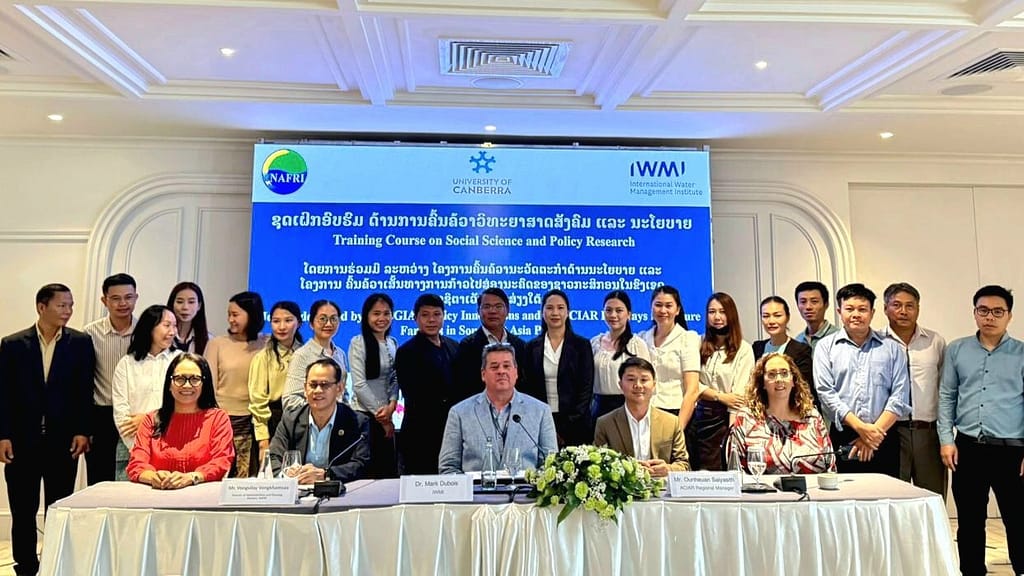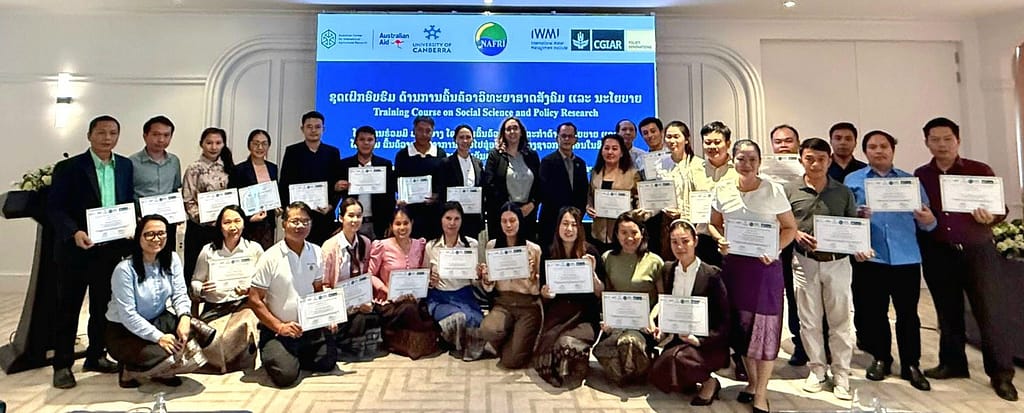
Agriculture remains fundamental to the economy and food security of Lao People’s Democratic Republic (PDR), employing approximately 70% of the workforce. Although Lao PDR has abundant water resources from the Mekong River system, inefficiencies in water use persist in irrigated agricultural practices. Furthermore, despite achieving self-sufficiency in rice production in 1999/2000, food insecurity continues to be a challenge. This is particularly evident in non-irrigated and mountainous regions that are highly vulnerable to the impacts of climate change. To support the government’s priorities on food security and agricultural commodity commercialization, research is crucial to generate evidence-based policies and practices.
The partnership between the International Water Management Institute (IWMI) and Lao PDR’s national Policy Think Tank (PTT) aims to advocate sectoral cooperation in transformative food production systems, specifically across the agriculture and rural development arm of the Ministry of Agriculture and Environment. Established under the National Agriculture and Forestry Research Institute (NAFRI), the PTT was set up to improve rural livelihoods. It serves as a cross-cutting coordination unit for agriculture and rural development, promoting evidence-based policy research and dialogue.
In June 2025, a two-day foundational policy research training course was jointly organized by IWMI and PTT, bringing together 30 emerging agriculture leaders from government, academia and civil society. Experts from the PTT learned critical research skills needed to implement its Policy Research Priority Agenda 2025-2030, which aims to inform transformative food production systems and policy engagement.
“The training allowed me to exchange knowledge and ideas about research work with other participants,” said Thipphaphone Phiengvilayvanh, a technical officer from the Department of Irrigation. “I gained a better understanding of research concepts and writing processes.”

Led by experts from the University of Canberra in Australia, participants dove into strengthening their research skills. PTT members upgraded their skills in coding for qualitative analysis, strategic communication and research dissemination. More importantly, they addressed the real-world challenge of making research relevant to policymakers.
For Vinaythong Nakhavong, a researcher from NAFRI, the impact is already clear. “I will apply the knowledge and skills in my day-to-day and future research, field surveys, data collection and data analysis.”
IWMI’s partnership with PTT is part of the Future Farmers in Southeast Asia project, supported by the CGIAR Policy Innovation Science Program and the Australian Center for International Agricultural Research (ACIAR). The project aims to strengthen the resilience of smallholder farmers in Southeast Asia, recognizing their contributions to regional food security, employment and natural resource management. As such, the project supports working with national policymakers to develop policies that help farmers adapt to future challenges and seize new opportunities.

Looking ahead, IWMI will continue to support PTT’s policy research agenda through generating collaborative knowledge, strengthening stakeholder consultations and building a network of science-to-policy champions at every level. The collaboration goes beyond individual skill building to transform how Lao PDR approaches some of its most pressing agricultural challenges. Better resource management and food security depend on experts who can translate complex findings into actionable policies.
“Together, we are making meaningful progress, and we look forward to further strengthening our partnerships,” said PTT coordinator Latsamy Phounmisouk.
Evidence-based, well-designed policies can transform development outcomes. As Lao PDR charts a path towards a more sustainable future, these newly trained champions represent something powerful — the bridge between what science knows and what policy can achieve.
















